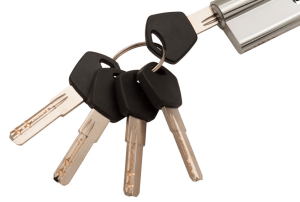You may have seen our recent Facebook post about imitator locksmith sites that try to exploit the good reputation and dominance of Advanced Lock and Security by having very similar names or our name with fake Google Place pages. These hucksters try to ride our coattails and fish for customers that are looking for the us – the real Been-Around-For-Years deal.
This type of online trickery occurs all the time, and not just with locksmiths, so here’s a few simple guidelines. This trickery got so bad with locksmiths a few years ago that Google moved to address it directly. That’s a neat story, so we’ll end the post with that one.
Being misled on the internet might seem especially easy and prevalent, but you can often tell good from garbage with a few simple guidelines and a good dose of common sense and gut instinct. If you’ve ever bought something good off the internet, then you’ve surely come really close to buying something bad.
When You’re on the Information Superhighway, Make Sure to Take the Right Exit
It might seem too simple of a mistake to make, but the wrong site suffix can send you off to all kinds of wrong. The first type of wrong is where a site is simply not at all what you’re looking for: a dead end. For example, Good.org will bring you to a church in Minnesota and good.com will bring you to a company that provides secure mobility management services.
The next kind of mistake is one where the destination site is specifically set up to take advantage of your mistake. A timely example is healthcare.gov vs healthcare.com. If you’re looking to sign up for healthcare through the Affordable Care Act, then you should go to the “.gov” site. The healthcare.com site is all set up to help get you health insurance – but it is not at all affiliated with the ACA. So, you may end up with health insurance, but not from where you were looking to get it from. Yes, not every site is a “.com;” there are “.org” sites for non-profits, “.edu” for schools, “.gov” for government sites and, “.biz” and “.tv too.” Not being sure if the site you’re looking for is .com or .org can get you quickly off course.
There are also sites that take advantage of misspellings. These are sites that have the same “.com” or whichever suffix, but are made to divert you from your intended destination or by making it seem like you’re already there. Make a quick misspelling for Google, and go to goggle, and you’re going to be lured into taking a survey. A neat, double layered example is heathcare.com. Forget the “L” in healthcare – AND – use the wrong suffix and you’ll end up on a dopey aggregator page about healthcare. So, not only will you not get to the “.gov” site you want, but you won’t even get to the site trying to divert you from your intended site. The point here is that for almost every type of mistake you can make, there’s a site set up to catch and exploit your mistake. Be careful.
You might think you’re too smart to make such a simple mistake, but these sites only exist because they keep getting enough traffic to remain profitable.
More than the simple dead-ends mentioned above, the next types are more like wrong turns into bad neighborhoods. These are the harmful ones, where the site is trying to imitate the destination of the other, “real” site. They can be pretty elaborate and convincing, so if you’re not sure where you’re going, then you won’t know that you’re not there when you arrive. Yes, confusing.
When is the last time a One-Way Mirror made you feel Comfortable?
There are two ways to avoid confusion when visiting a website: emotions and data. Emotionally, when we (the folks here at Advanced Lock and Security – that We) look for a local business, we are more likely to do business with one that feels like it’s looking back. What that means is that if the friendly, authentic feeling of a good, local business comes through on their site, then we’re more likely to feel good about interacting with them personally and commercially.
As nebulous as this may seem, it’s been a good barometer to keep us dealing with good businesses and nice people. If a site is worded well, has authentic pictures of product, work or staff , then chances are the actual people of the company had a say in, and a contribution to, the site’s content. Even if they didn’t – a real effort was made to illustrate, connect and share. If a website is the online representation of a business, then shouldn’t it feel like it involves real people and shouldn’t those people be real nice?
Conversely, if a site is abrupt, awkward, brief and bland, we just don’t feel like dealing with them. Often you can spot a junk site or scam business because it’s like a one-way mirror: the site is looking for customers but, when the customer looks in, they can’t see any people looking back. Junk sites often seem to have no personality, no staff, no history and nothing to say, other than “Gimme,” because they’re set up to take your money, not get your business. There’s a difference and you can feel it. If you don’t believe it, then what made you read this far?
Authenticity and connection takes real people and real effort. If a business isn’t trying to reach out to you, then why are you trying to reach out to it? Behind every search is a person reaching out and so, behind every site, it should feel like another person is reaching back. You might say – “well, I need this thing done,” or “I want to buy that thing,” but with the internet giving you so much access to so many companies, why would you choose to deal with any company where it felt like paying a parking ticket instead of buying a movie ticket?
Time Spent Now is Money Saved Later
Should you totally trust your gut instinct? No, that’s where the data part of comes in. Where do you get this magic data? Other people. If you’re not sure of your own feelings, then look into other people’s: search for reviews on companies. The neat thing about eBay is the built-in culture of peer review. Right next to everyone’s user name is their percentage rating on how many people had good experiences with them. The goofy show Community had a recent episode about an app – for people – that did just that. Spoiler: it didn’t go quite well. Luckily, online , it tends to workout better.
Reviews are another way of sifting out scam sites. Reviews, like the personal touch on a local business website, take extra time and effort, and like extra time and effort, scammers avoid that as much as possible. Search engines put a lot of effort into catching, flagging and eliminating scam sites, so fully fleshing out a business online just doesn’t pay off for them. Like running from a gobbling Pac Man, scammers don’t have the time to stay and work on one site very long. It took you time to earn your money, so take a minute, before you spend it, to do a bit of research.
Reviews can be faked too though, so don’t just look at one source. We had a case last year, where a business called to solicit their web help to us and we did a review search. The funny part there was that, because they were an SEO company, they’d at least likely be good at making themselves look good online. Sure enough, after perusing a string of reviews, we found an identical review from two different reviewers. Busted. They got lazy and just copy/pasted one of their own, made-up reviews.
These scams continue and, in the locksmith category, such scamming is prevalent. That image on the left, is a 2009 image of NYC and all the dots represent supposed locksmiths. One for every door, it seems. This kind of scamming
often happens when a business provides an emergency service, like being locked out, and the customer’s need makes them vulnerable. We’ve said it before, it’s good to have a cache of trustable businesses before you need them, so you don’t get caught going with someone you need more than you trust.
For Locksmiths, you’re all set, (face it, you like us) but take a bit to ask around about good mechanics, plumbers and contractors. Time spent now is money saved later.
[/fusion_builder_column][/fusion_builder_row][/fusion_builder_container]


